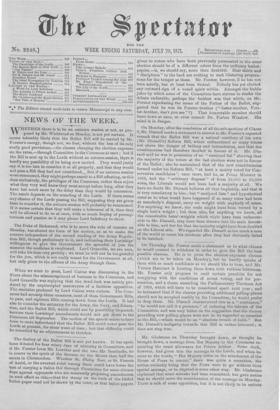On Thursday Mr. Forster made a statement as to what
clauses he would consent to withdraw in order to give the Bill the best possible chances. He is to press the election-expenses clauses (which are to be taken on Monday), but he hardly speaks of them with as much confidence as we should like to hear, and Mr. Vernon Harcourt is hunting them down with ruthless bitterness. Mr. Forster only proposes to omit certain penalties for not complying with the conditions of secret voting, and for per- souation, and a clause amending the Parliamentary Elections Act of 1868, which will have to be considered apart next year ; and he intimated that if the clauses providing additional polling-places should not be accepted readily by the Committee, he would prefer to drop them. Mr. Disraeli characterized this as a " semblance," "ho would not call it a pretence," of reducing the labours of the Committee, and was very bitter on the suggestion that the clauses providing new polling-places were not to be regarded as essential to the Bill,—which would be an "absolute breach of faith." But Mr. Disraeli's malignity towards this Bill is rather laboured ; it does not ring true.
































